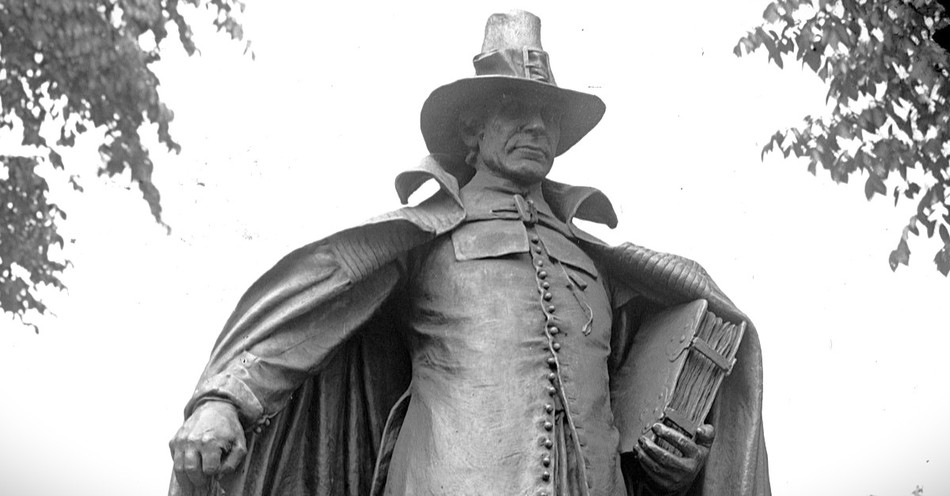Who were the Puritans? What did the Puritans believe? Historians give examples of Puritans who chose a particular way of life due to their strict religious beliefs. Some of those people and their actions were controversial. Yet, some of those beliefs continue today.
What Are Puritans?
A dictionary defines a Puritan as “a member of a group of English Protestants of the late 16th and 17th centuries who regarded the Reformation of the Church of England under Elizabeth as incomplete and sought to simplify and regulate forms of worship.”
A Puritan followed a stern moral code and lived by religious values. The Puritans held firm to their beliefs and wanted others to adhere to those strict ways of life. Harsh consequences were given to those who did not choose to follow the rules.
When Did Puritanism Start?
Historians say that the Puritan movement started in the English Reformation. Enemies of the movement were said to have given the name “Puritans” as a term of contempt.
While the word “Puritans” didn't come into use until later, the groundwork for Puritanism was laid in the 1530s when King Henry VIII broke ties with the Roman Catholic Church. Henry set up the Church of England, removing the Pope's power. Historians list Henry wanting to divorce his first wife as an important reason for this change; other reasons included a desire to move away from the rituals of Roman Catholicism. As the Church of England (also called the Anglican church) developed, Puritanism developed within it. Some Puritans wanted to totally separate from the Anglican Church. Others wanted to bring about change while remaining part of the church.
As more and more families wanted to move away from ritualistic teachings, many Puritans left their homes for America, hoping to find a different life in a new land. Those families hoped to find religious freedom. The 16th- and 17th-century Puritans followed teachings by people such as John Winthrop, the first Puritan leader in America. He was responsible for banishing people who did not follow the Puritan way.
The “Great Migration” refers to the time when English Puritans migrated to Massachusetts and the Caribbean. In 1620, a Puritan offshoot called the Brownists (later known as the Pilgrims) traveled to the New World and established Plymouth Colony, which was later developed into the town of Plymouth, Massachusetts. Imagine the number of people on a ship set for America. Besides the crew and deckhands, there were people of all ages, including families with children who would have needed food and basic necessities for hygiene. Consider the sights, sounds, and smells the people endured to reach their destination.
What Were the Basic Beliefs of Puritanism?
According to historians, Puritans believed the Bible held the guidelines for actions in life, and in having a covenant relationship with God to be redeemed from sin. To separate from the structure and ceremonies of the church, Puritans sought to focus on their strong morals. The Puritan people believed strongly in education, which enabled people to be able to read the Bible.
Puritans believed there should not be any rituals or ceremonies that were not found in Scripture. They also thought the government should punish behavior such as swearing in public and drunkenness.
How Did John Calvin Influence Puritanism?
Puritans felt that salvation was God’s decision and that only a certain number of people would be saved. The teachings of John Calvin, including the belief in predestination, influenced the Puritans. Calvinism’s beliefs on salvation are often summarized by the acronym TULIP.
T (Total depravity): people are sinful
U (Unconditional election): God chooses who will be saved
L (Limited atonement): Christ did not die for everyone, only those selected
I (Irresistible grace): once God chooses a person, they are saved and called to preach God’s Word to others
P (Perseverance of the saints): when God chooses a person, they will never turn to evil again
What Did the Puritans Ban?
Some Puritans did go to extremes to regular moral behavior. Things that various Puritans banned included gambling, adultery (with a death penalty), fancy clothing (including embroidered items), living with Native Americans, celebrating Christmas, and smoking in public. Also, missing church services could result in punishment.
How Did Puritanism Change America?
Historians report that Puritans are known for their dedication to education. Through knowledge obtained by reading and writing, people gained self-reliance.
The Puritans formed foundations for success in politics and religion, including a series of rules were put into place that helped create the political structure of the New England colonies.
Today, in America, some churches continue to have differing opinions about leadership and guidelines for congregants. The Puritans wanted reform in their religion, as change would enable more people to read and learn from God’s Word. By learning the Puritans’ history, accomplishments, and mistakes, we can see what worked and what didn’t succeed.
Why Does Puritanism Matter Today?
Today, America’s strong emphasis on education owes a great deal to Puritanism. Reading at every age is vital to keeping a healthy mind and success in many aspects of life. Some people read to babies in the womb and continue to emphasize reading and writing throughout life. According to studies, having the ability to learn writing and arithmetic and reading allows the opportunity for success in employment, social, and other areas of life.
Multiple Puritans contributed groundbreaking books and teaching that still influence people today. Notable Puritans included:
1. Anne Bradstreet: author who wrote about politics, history, theology, and more
2. John Bunyan: minister and author of The Pilgrim’s Progress.
3. John Owen: minister, writer, and vice-chancellor of Oxford University.
4. John Flavel: famous author of many books, including The Righteous Man’s Refuge.
5. Anne Hutchinson: religious reformer and spiritual adviser
Religion in America Today
Today, America has various beliefs and religions. As Christians, we know there is only one God. Christians read the Bible, which is the Word of God. The Bible was given to us by the Father, so we may learn from the past and prepare for the future. His Word stands true today. While there may be disagreements between Christians, there is always an opportunity to seek guidance from God. Prayer is our open door to communicating with God.
Churches have opportunities to learn from each other. Forms of government can differ in various congregations. Some choose to have leaders in the church make decisions, while others choose to consult members for any change. False prophets are alive and seeking to destroy the will of God. As children of God, we can ask God for wisdom and discernment in guarding against those who share false teachings.
While the Puritans sought to lead a God-centered life, at times, their focus was on what “not to do.” Today, Christians put trust and faith in God. Worshiping Him and not people can help strengthen our faith and deepen our relationship with the Father.
Prayer for Learning from the Past
Heavenly Father, thank You for providing many ways for us to learn from the past. Thank You for giving us the Bible so we may read and study Your Word. Help us to stand firm when our beliefs are questioned. Guide us to ways to help others know You. Guide us to be humble, compassionate, and understanding. Father, guard us against false prophets who try to change our beliefs. Help us to learn from the past. You are the one true God. In the name of Your Son Jesus, Amen.
In His Name,
Melissa Henderson
Further Reading:
5 Myths You Might Still Believe about the Puritans
Photo Credit: Public Domain Photo (via Library of Congress and Wikimedia Commons)

Melissa is the author of Licky the Lizard and Grumpy the Gator. Her passions are helping in the community and church. Melissa is an Elder, Deacon, and Stephen Minister.
Follow Melissa on Facebook, Twitter, Pinterest, and at https://www.melissaghenderson.
This article is part of our Christian Terms catalog, exploring words and phrases of Christian theology and history. Here are some of our most popular articles covering Christian terms to help your journey of knowledge and faith:
The Full Armor of God
The Meaning of "Selah"
What Is Grace? Bible Definition and Christian Quotes
What is Discernment? Bible Meaning and Importance
What Is Prophecy? Bible Meaning and Examples




